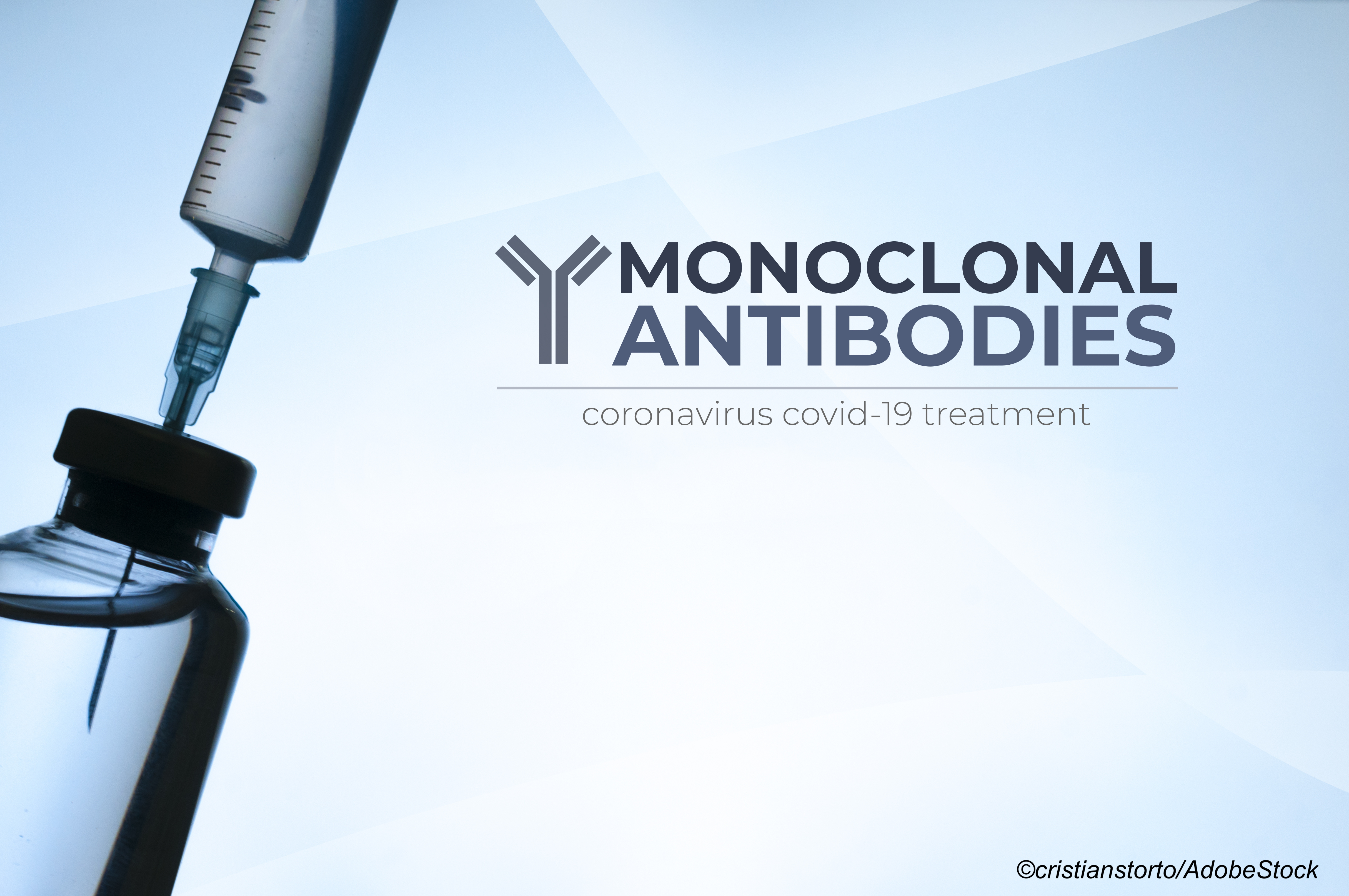Early analysis of data from the ongoing COMET-ICE clinical trial showed treatment with the biologic sotrovimab to reduce progression to severe Covid-19 in high-risk patients with mild-to-moderate disease symptoms.
In the interim analysis, published online Oct. 27 in The New England Journal of Medicine, patients treated with a single 500-mg dose of sotrovimab had an 85% relative risk reduction in the study’s primary endpoint of hospitalization and death, compared to placebo-treated patients.
The novel monoclonal antibody therapy was authorized by the FDA for the treatment of Covid-19 late last spring under an Emergency Use Authorization (EUA). The biologic neutralizes SARS-CoV-2 and other sarbecoviruses, and it has been shown in laboratory studies to retain its activity against SARS-CoV-2 variants of concern, including Delta, Gama, Lamda, Alpha, and Beta.
COMET-ICE researcher Anil Gupta, MD, of the William Osler Health Centre, Toronto, and colleagues noted that sotrovimab contains “a two–amino acid Fc modification (termed LS) to increase half-life and potentially improve bioavailability in the respiratory mucosa through enhanced engagement with the neonatal Fc receptor. This modification may permit therapeutic concentrations for longer durations.”
Their analysis included an intention-to-treat population of 583 non-hospitalized Covid-19 patients (n=291 sotrovimab group; n=292 placebo group) with at least one risk factor for progression to severe disease. There were four patients who withdrew in each arm of the trial.
Patients were recruited for the trial beginning in late August 2020 and were followed through early March of this year at 37 trial sites in four countries—the United States, Canada, Brazil, and Spain.
“A prespecified interim analysis for safety, futility, and efficacy was triggered when approximately 41% of the required number of trial patients reached day 29,” the study authors wrote.
A total of 3 patients (1%) in the sotrovimab group progressed to hospitalization or death, compared with 21 patients (7%) in the placebo group, for a treatment-related relative risk reduction of 85% (97.24% confidence interval [CI], 44-96; P=0.002).
None of the patients treated with sotrovimab who were later hospitalized for 24-hours or longer were admitted to the ICU, compared to five patients in the placebo arm of the study, suggesting that treatment with sotrovimab “prevented more severe complications of Covid-19 in addition to preventing hospitalization,” Gupta and colleagues wrote.
“Adverse events were reported by 17% of the patients in the sotrovimab group and 19% of those in the placebo group; serious adverse events were less common with sotrovimab than with placebo (in 2% and 6% of the patients, respectively),” they added.
A total of 63% of the study participants identified as Hispanic or Latino.
“This trial showed efficacy in a population that has been underrepresented in clinical trials involving patients with Covid-19, despite the disproportionately negative effect that the pandemic has had on this ethnic group,” the researchers wrote.
Interim analysis limitations included the very small number of patients in the sotrovimab group progressing to hospitalization or death, making it impossible “to determine which patient or disease characteristics might be associated with sotrovimab treatment failure,” they added.
In addition, the number of patients included in the safety analysis was insufficient to identify rare adverse events, and “the presence of baseline autologous antibody responses to SARS-CoV-2 has not yet been analyzed to determine what effect emerging autologous immunity may have on the safety and efficacy of sotrovimab.”
Despite these limitations, Gupta and colleagues concluded that the COMET-ICE analysis “has implications beyond showing the therapeutic value of sotrovimab.”
“First, the results indicate that a single binding antibody against the non-receptor-binding motif, which does not directly block the ACE2 receptor interaction, can be clinically therapeutic, and thus the results suggest a role for other receptors,” they wrote.
“Second,” they noted, “because sotrovimab has a potent effector function, the efficacy and absence of safety signals suggest that effector function is neither detrimental nor associated with antibody-dependent enhancement. In fact, preclinical models of Covid-19 suggest that the potent effector function of this agent may be beneficial.”
The researchers noted that intramuscular administration of sotrovimab may be possible given the 500-mg dose.
“Studies are currently under way to evaluate this route of administration,” Gupta and colleagues wrote. “Given its in vitro activity against variants of interest and concern, as well as its ability to neutralize other sarbecoviruses, we speculate that sotrovimab has the potential to remain therapeutically active even as SARS-CoV-2 continues to evolve.”
-
Patients treated with a single 500-mg dose of sotrovimab had an 85% risk reduction in the study’s primary endpoint of hospitalization and death, compared to placebo-treated patients.
-
A total of three patients (1%) in the sotrovimab group progressed to hospitalization or death, compared with 21 patients (7%) in the placebo group.
Salynn Boyles, Contributing Writer, BreakingMED™
The COMET-ICE trial is being funded by Vir Biotechnology and GlaxoSmithKline.
Anil Gupta reported receiving funding support from Vir Biotechnology and GlaxoSmithKline.
Cat ID: 190
Topic ID: 79,190,730,933,190,926,192,927,151,928,925,934



